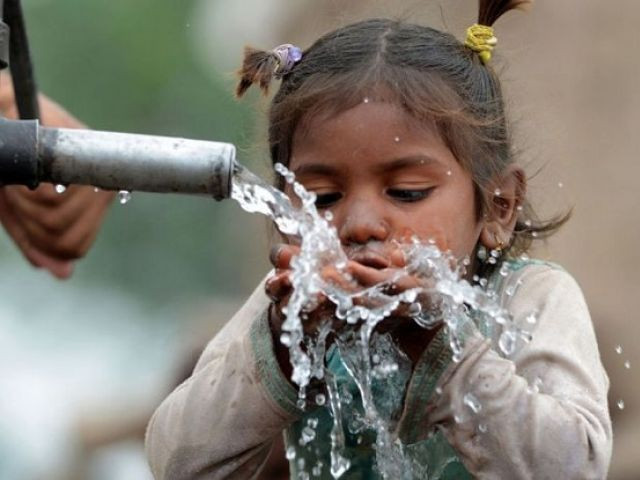Every drop counts: Expert stresses need for policy to ensure sustained water supply
Khalid Mohtadullah says global demand for water will increase by 40% by 2030

PHOTO: AFP
Mohtadullah was speaking at the inaugural session of Centre for Water Informatics and Technology at the Lahore University of Management Sciences (LUMS).
The session titled Smart Water Management: Challenges and Opportunities for Pakistan was attended by Massachusetts Institute of Technology’s (MIT) James Wescoat, Stanford University’s Sally Benson, Mehran University of Engineering and Technology’s Bakshal Lashari, Abubakr Muhammad from the LUMS and former irrigation secretary Arif Nadeem.
Mohtadullah gave a presentation on the global water demand and the things to come. He stressed the need for creating a policy to ensure a sustained supply for all. He said the world had made significant progress with regard to achieving millennium development goals (MDGs) in water sustainability.
Mohtadullah said agriculture was the sector using most of the fresh water. “It accounts for 70 per cent of water use worldwide. In Pakistan, the ratio is around 95 per cent.” “We must realise the need for addressing the issue of depleting water resources.”
He said that reduced and polluted water resources coupled with climate change had forced people to migrate all over the world. A similar trend could soon be seen in Pakistan, Mohtadullah said. He said that for Pakistan water was closely linked to the country’s economy. “Realising the connection between water and economy should be a reason for the stakeholders to act,” he said.
Mohtadullah also discussed the impact of the Indus Waters Treaty on Pakistan with regard to a decline in water availability in the country. He said Pakistan must invest in water-storage initiatives to avoid a drought.
“Pakistan has only 30 days of water reserves, lower than India and many other countries whose economies largely depend on agriculture.”
Speaking to The Express Tribune, LUMS Vice Chancellor Sohail Naqvi said the Centre for Water Informatics and Technology could greatly impact the country’s water policies. He said the centre had brought together people from various academic background… to propose a solution to water scarcity.
Later, James Wescoat moderated a panel discussion in which Arif Nadeem stressed the need for Pakistan to address the issue of water pollution. He said River Ravi was the most polluted in the country because of the waste from industries that was dumped in it.
Sally Benson said that California had faced similar problems and that Pakistan could benefit from the solutions the US state had come up with to address the issue.
“California had faced four years of drought devastating its agriculture sector. However, the state resorted to innovative solutions… lowering its dependence on water.”
Published in The Express Tribune, January 23rd, 2016.


















COMMENTS
Comments are moderated and generally will be posted if they are on-topic and not abusive.
For more information, please see our Comments FAQ